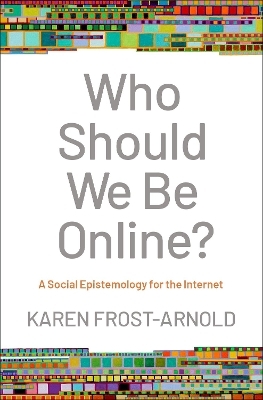
Who Should We Be Online?
Oxford University Press Inc (Verlag)
978-0-19-008918-4 (ISBN)
Global inequalities and our social identities shape who we are, who we can be online, and what we know. From social media to search engines to Wikipedia, the internet is thoroughly embedded in how we produce, find, and share knowledge around the world. Who Should We Be Online? examines the challenges of the online world using numerous epistemological approaches. Tackling problems of online content moderation, fake news, and hoaxes, Frost-Arnold locates the role that sexism, racism, and other forms of oppression play in creating and sharing knowledge online.
Timely and interdisciplinary, Who Should We Be Online? weaves together internet studies scholarship from across the humanities, social sciences, and computer science. Frost-Arnold recognizes that the internet can both fuel ignorance and misinformation and simultaneously offer knowledge to marginalized groups and activists. Presenting case studies of moderators, imposters, and other internet personas, Frost-Arnold explains the problems with our current internet ecosystem and imagines a more just online future. Who Should We Be Online? argues for a social epistemology that values truth and objectivity, while recognizing that inequalities shape our collective ability to attain these goals. Frost-Arnold proposes numerous suggestions and reform strategies to make the internet more conducive to knowledge production and sharing.
Karen Frost-Arnold is Associate Professor of Philosophy at Hobart & William Smith Colleges. Her research focuses on the philosophy of the internet, the epistemology and ethics of trust, social epistemology, philosophy of science, and feminist philosophy.
Acknowledgments
Chapter 1: Introduction
1. Frameworks for social epistemology of the internet
1.1. The situated knowledge thesis
1.2. Feminist accounts of objectivity
1.3. Veritistic systems-oriented social epistemology
1.4. Epistemologies of ignorance
1.5. Virtue epistemology
1.6. Epistemic injustice
2. Chapter summaries
Chapter 2: Moderators
1. What is online content moderation?
2. Varieties of moderation and censorship debates
3. The epistemic challenges of moderation
4. The virtues of moderators
5. Constraints on moderators
6. Commercial content moderation, epistemic exploitation, and epistemic dumping
7. Algorithms to the rescue?
Chapter 3: Imposters & Tricksters
1. Objectivity and truth
1.1. Objectivity and truth in feminist and veritistic epistemology
1.2. Objectivity, truth, and trust
2. Imposters: Undermining objectivity and truth
3. The need for trustworthiness
3.1. Trust and authenticity
3.2. Practical wisdom and trustworthiness
4. Tricksters: Resisting oppression
4.1. The epistemic benefits of betrayal
4.2. Internet tricksters
4.3. Changing epistemic landscapes and trickery
4.4. Who should we be online?
Chapter 4: Fakers
1. What is fake news?
2. Causes of the fake news problem
2.1. Cognitive/psychological
2.2. Technological affordances/design features
2.3. Social causes
3. The epistemic damage of fake news
3.1. Fake news and false belief
3.2. Fake news and distrust
4. Fake news and white ignorance
5. Fake news, objectivity, and neutrality
6. Conclusion
Chapter 5: Lurkers
1. The internet as a medium for unlearning ignorance
2. What is lurking?
3. The epistemic benefits of lurking
4. Epistemic limitations of lurking
5. Harmful modes of interaction: Ontological expansiveness
6. A virtue epistemology for lurking and online engagement
6.1. Virtues relevant to lurking and engagement
6.2. The importance of practical wisdom
7. Applying the virtue epistemology of lurking
8. Objections and replies
Chapter 6: Conclusion
Appendix: Internet Research Ethics for Philosophers: Privacy, Positionality, and Power
1. Purpose of this appendix
2. Respecting privacy
2.1. Complications for the 'public data' presumption
2.2. Alternatives to simply quoting material one can access online
3. Protecting the researcher in an environment of online harassment
4. Avoiding epistemic appropriation
5. Cultivating a
| Erscheinungsdatum | 29.12.2022 |
|---|---|
| Verlagsort | New York |
| Sprache | englisch |
| Maße | 236 x 164 mm |
| Gewicht | 558 g |
| Themenwelt | Geisteswissenschaften ► Philosophie ► Erkenntnistheorie / Wissenschaftstheorie |
| Geisteswissenschaften ► Philosophie ► Ethik | |
| ISBN-10 | 0-19-008918-0 / 0190089180 |
| ISBN-13 | 978-0-19-008918-4 / 9780190089184 |
| Zustand | Neuware |
| Informationen gemäß Produktsicherheitsverordnung (GPSR) | |
| Haben Sie eine Frage zum Produkt? |
aus dem Bereich

![Was heißt Denken?. Vorlesung Wintersemester 1951/52. [Was bedeutet das alles?] - Martin Heidegger](/media/113619842)
